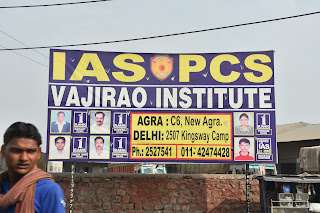Only now, writing this, do I discover that both books are by the same author, Chetan Bhagat, who describes himself on the inside cover as a writer "focusing on youth and national development issues", as well as "motivational speaker", and ex-international investment banker who gave the job "to devote his entire time to writing and make change happen in the country". Yes, that's a mite off-putting, I'll concede, but if this guy can't tell me about social change in India, who can?
OK, this is a slight novel. It was easily read in a day - the day of our return journey from India - but it did the job, it did provide an insight into how things work for the aspirational Indian middle class, even if Bhagat is using his book to argue against the extremes to which the students in elite institutions are pushed by the system.
The story is one of three friends enrolled at the IIT (Indian Institute of Technology), seen as the ultimate path to worldly success. Entry is ferociously competitive, and all three friends have crammed (actually, "mugged" is their word) intensely to get in. However, once in, the three friends, Hari, the narrator, Ryan, the cool good looking one from a wealthy background, and Alok, the overweight, anxious one, from a humble background, do not follow through. They rebel against the 14-hour days, the intense "mugging", the demands of mute memorisation placed upon them. They become semi-dropouts, with grades sufficient just to scrape through, five point something, rather than the sixes and sevens their classmates average. They thus become "five point someones". The three friends skip classes, cheat on exams, cut corners, gad about town, drink vodka and smoke weed. Hari pursues a relationship with a beautiful girl, inconveniently the daughter of his head of faculty, which to western eyes is incredibly restrained and chaste (she is a "good girl"). Alok is constantly troubled by his family's expectations of him - notably the provision of a dowry for his unfortunately rather plain sister whom they are desperate to marry off - which he knows, as a "five point someone" he is unlikely to meet.
The novel plays out as a morality tale of a relatively conventional sort. The boys duly learn to commit, and mend their ways, but, at the same time the school learns to value their actually not inconsiderable abilities, which are of the creative sort not favoured by the academic drudgery which characterises the school system. Although it doesn't work out exactly as one would expect (I won't spoil), in the end there is a satisfactory outcome, and, yes, along the way it is a fun, page-turning read.
Did it provide any insight? That was the point, after all.
 |
| Chetan Bhagat |
It did. It depicts a world where modernity, manifested in a thousand small ways, both clashes and finds an accommodation with tradition; where the genuine chance of transforming success and wealth continues to exist alongside a daily grind of poverty; where contrasting extremes are part of life; where western values and vices are making steady inroads into everyday life; where money both is and isn't what it's all about.
Maybe the insight wasn't that great - I suppose I could have come up with most of that list beforehand, but it did give it a human face. Moreover, the perspective is very much that of the aspirational middle class. Ultimately too, the boys' travails are relatively "safe". But that too tells you something too: this is a book presumably aimed at certain kinds of reader living in a certain kind of world. These are their preoccupations; to that extent it is real.
A fun book, a quick read, and some insight for an India rookie.
And now the gallery of aspirational school ads. All photos taken in Agra.
And now the gallery of aspirational school ads. All photos taken in Agra.







No comments:
Post a Comment